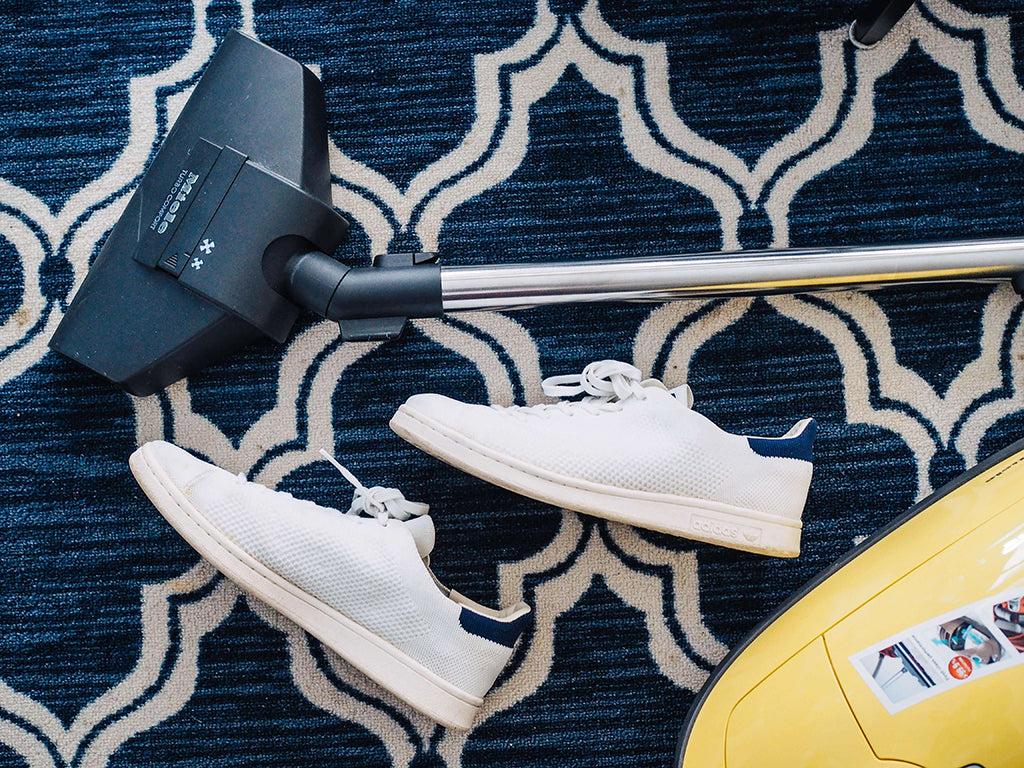Summary: Dog scared of vacuum? Well, rest assured, yours isn’t the only one! If you’re asking “why are dogs afraid of vacuums?”, in this blog we learn why many dogs hate vacuum cleaners and learn how to help them overcome their fear… Why Are Dogs Scared Of Vacuums? The most obvious reason your dog […]
Why Are Dogs Scared Of Vacuums?

Summary: Dog scared of vacuum? Well, rest assured, yours isn’t the only one! If you’re asking “why are dogs afraid of vacuums?”, in this blog we learn why many dogs hate vacuum cleaners and learn how to help them overcome their fear…
Why Are Dogs Scared Of Vacuums?
The most obvious reason your dog may hide, cower or bark at the vacuum cleaner is simply because they’re loud! Dogs have very advanced hearing which means they’re significantly more sensitive to high volume levels than we are.
Another reason is the fact that when the vacuum cleaner is turned on, it is often a surprise. Dogs are creatures of habit, so if you play loud music or watch the television every day, they’ll become accustomed to that noise and expect it. When the vacuum only gets turned on a couple of times a week, this can then be more of a shock to your dog’s senses.
They also don’t look very friendly, so your dog may perceive the vacuum as a physical threat to themselves, their master (you), and their pack (the others in the household), so may bark as a way to warn and protect you from it.

Can Dogs Smell Through Vacuum Sealed Bags?
A dog’s smell is incredibly advanced, and they’ll be able to smell what’s in the pipe and non-airtight crevices of your vacuum cleaner. Dogs can even smell things that are underwater! However, they can’t smell what’s in air-tight containers and those that are vacuum-sealed.
Odors depend on air. If no air can escape, then a scent can’t travel to your dog’s nose. So, your dog will be able to smell what’s in your vacuum cleaner, only if air is present.
Here’s How To Help A Dog That’s Scared Of Vacuums
As we mentioned above, dogs are creatures of habit and you can use this knowledge to your advantage to help alleviate your dog’s fear of the vacuum.
Firstly, if your vacuum lives in a cupboard most of the time, try placing the vacuum cleaner in the room your dog hangs out in the most for an hour every day for a week. This way you’ll help your dog become accustomed to the vacuum being around and they’ll start to recognize its visual appearance as a friend, not foe.
Next up, it’s time to get them used to the sound. After the vacuum’s been out and visible for an hour a day over a week, begin bringing it out and putting it on for 10-15 seconds. Over another week, extend this time by another 10 seconds each day.
Then, when it’s time to actually clean your home, try to fix a set time every week that you use it that works for you and your dog. This will help get your dog into the routine of expecting the noise and action. Try to avoid using it during another of their scheduled activities (like their meal times or whilst they sleep) as this will shock them. It’s also advisable to avoid other busy, loud times in the house (for example, whilst a food processor works or a baby cries) as this may feel like an assault of your pooch’s senses. A good routine can help a dog conquer their fear of the vacuum cleaner.

Can I Vacuum My Dog?
This question depends on your dog’s attitude towards a vacuum cleaner and whether you have a soft, bristled, dog-specific attachment to fix on to your vacuum. Vacuum cleaners and their suctions are too powerful on your dog’s skin and will hurt them unless you have a dog-specific attachment that’s designed for use on a dog. A vacuum should only be used to help remove loose, already shed hair too.
If your dog is terrified of the vacuum cleaner, do not attempt to vacuum them until you’ve gotten them used to the noise and visual presence of the machine as detailed above.
If your dog is OK around the vacuum cleaner, before you vacuum them with the dog-specific attachment, allow them to sniff the machine and become familiar with it up close whilst giving them lots of praise. Then, attach the dog-friendly, soft, bristled attachment to the sucker and praise them whilst you use it. Give them lots of nice treats whilst you vacuum their fur too.
If your dog is terrified, shaking, or barking a lot, stop immediately. If fur is coming out of your dog’s skin, also stop immediately. Grooming a dog with a brush every day and a regular bathing regime can be just as helpful at removing excess, shed hair as using a vacuum. If your dog is in any way reluctant or hesitant around the vacuum cleaner, do not attempt to or continue to vacuum them.
Sources
“Why Is My Dog Afraid Of Vacuum Cleaners?” Sep 4. 2020, Mad Paws https://www.madpaws.com.au/blog/why-is-my-dog-afraid-of-vacuum-cleaners/
“Can Dogs Smell Through Air Tight Containers?” Wag Walking https://wagwalking.com/sense/can-dogs-smell-through-airtight-containers
“How To Vacuum Your Dog” Dec 16. 2020, Dog’s Best Life https://dogsbestlife.com/dog-grooming/vacuum-your-dog/?cn-reloaded=1
 S
S



